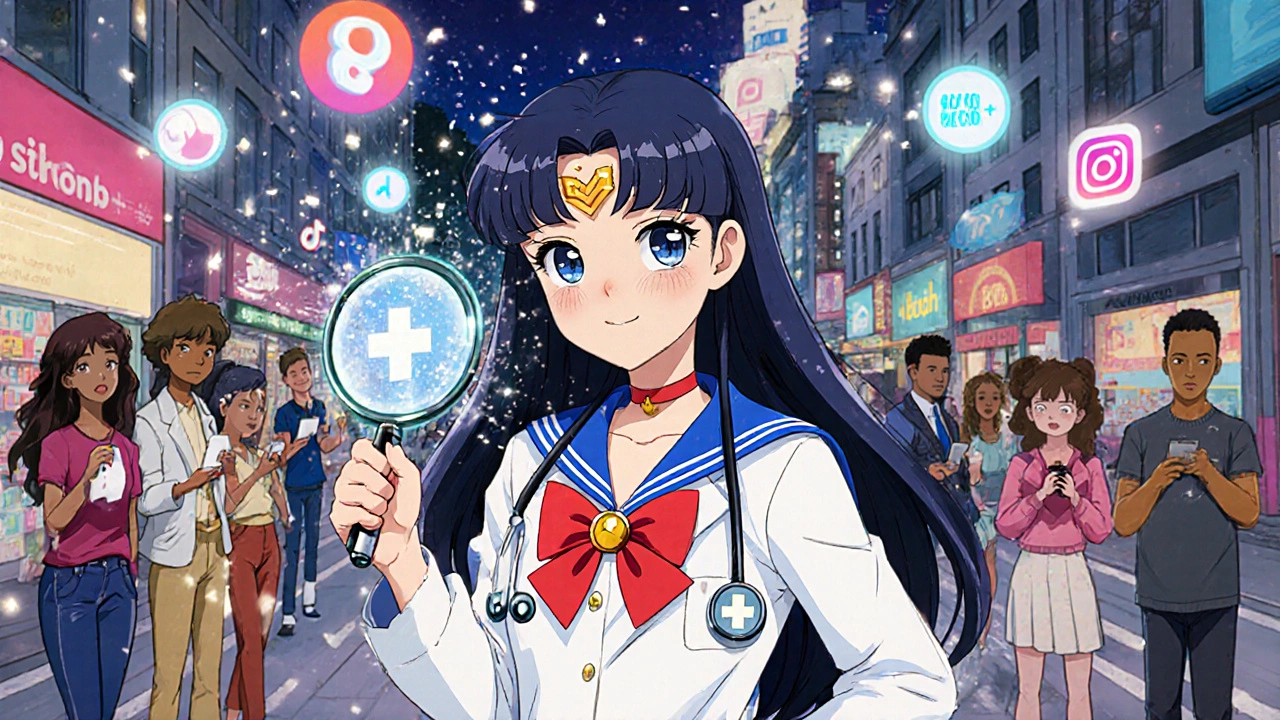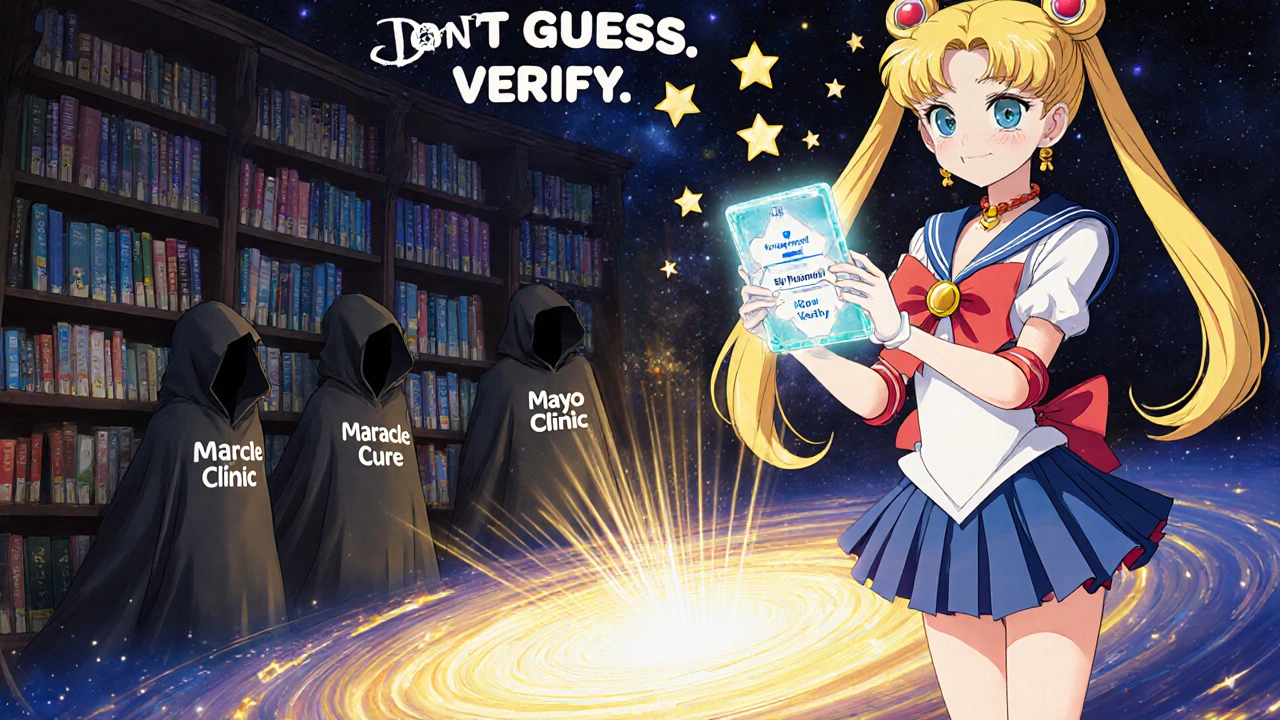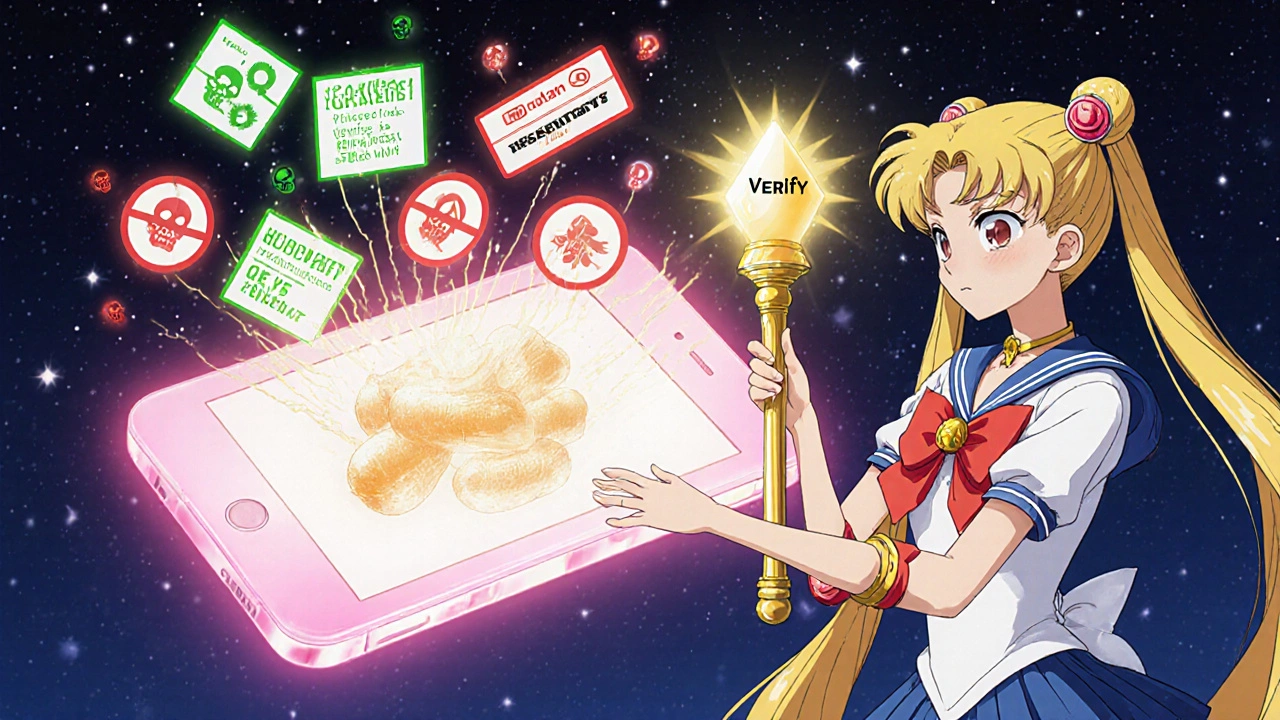Every day, millions of people scroll through TikTok, Instagram, and YouTube looking for health advice. Someone with a big following says taking turmeric with honey cures arthritis. Another claims a new supplement boosts your immune system overnight. A third says you should stop your blood pressure meds because they’re “toxic.” These posts aren’t just misleading-they’re dangerous. And they’re everywhere.
When it comes to medication, social media isn’t a doctor’s office. It’s a marketplace of rumors, paid promotions, and viral myths. The CDC says nearly 60% of Americans use the internet to look up health info. That’s not a problem-unless you don’t know how to tell real advice from fake. The World Health Organization called this surge of health misinformation an “infodemic,” especially during the pandemic. And it didn’t stop. In 2025, unsafe medication advice is still spreading fast, and the consequences are real: hospital visits, drug interactions, allergic reactions, even deaths.
Who’s Really Giving This Advice?
Before you believe anything you see, ask: Who is this person? Most of the time, they’re not a doctor, pharmacist, or nurse. They’re a content creator with 500,000 followers who got paid to promote a supplement. Their background? “I healed myself with lemon water.” That’s not a medical credential. It’s a marketing pitch.
Health professionals are legally required to have a patient relationship before giving advice. If someone on Instagram tells you to switch your diabetes medication based on their cousin’s experience, that’s not just bad advice-it’s illegal for them to give it. Licensed providers don’t post quick fixes. They ask questions: What’s your history? What meds are you on? Do you have kidney issues? Social media doesn’t do that. It simplifies. And simplification kills.
The Red Flags You Can’t Ignore
Here’s what unsafe medication advice looks like in the wild:
- “Miracle cure” claims - “This one pill cures fibromyalgia!” “Reverse type 2 diabetes in 7 days!” If it sounds too good to be true, it is. Real medicine doesn’t work that way. The FDA has issued warnings on dozens of fake supplements making these exact claims.
- Secret knowledge - “Doctors don’t want you to know this!” “Big Pharma is hiding the truth!” This is a classic manipulation tactic. Legitimate science doesn’t hide findings-it publishes them in peer-reviewed journals. If you can’t find the same info on CDC.gov, NIH.gov, or Mayo Clinic’s site, it’s not credible.
- One-size-fits-all advice - “Everyone should take this.” Nope. What helps one person could hurt another. Someone with liver disease shouldn’t take the same herbal blend as someone healthy. Your age, other meds, allergies, and chronic conditions matter. Social media never asks.
- Product promotion disguised as advice - A video says, “I use this supplement every morning,” then links to a Shopify store. That’s not advice-it’s an ad. The FTC requires influencers to disclose paid partnerships, but most don’t. If the post is pushing a product, assume it’s biased.
- Emotional language - “This saved my life!” “I was on death’s door!” Fear and hope are powerful tools. Scammers use them to bypass your logic. Real medical advice is calm, evidence-based, and acknowledges uncertainty.
How Algorithms Make It Worse
Why do you keep seeing this stuff? Because the algorithm wants you to. Social media platforms don’t care if you’re safe-they care if you click, watch, and comment. If you’ve liked a post about natural cures for anxiety, you’ll keep getting more. Soon, your feed is full of anti-medication rants and miracle supplement ads. This is called an echo chamber. It traps you in a bubble of misinformation.
Research from the University of Denmark shows people who distrust vaccines end up seeing completely different information than those who trust them. That’s not coincidence. It’s design. And it’s dangerous when it comes to medication. You’re not just seeing bad advice-you’re being fed a version of reality that reinforces your fears or beliefs, no matter how wrong they are.

How to Verify Anything You See
You don’t need to be a scientist to spot safe advice. Here’s a simple three-step check:
- Check the source - Who said it? Look them up. Are they a licensed provider? Do they have credentials you can verify? A registered pharmacist has a license number you can check online. A TikTok influencer? No.
- Check the claim - Search the exact claim on CDC.gov, FDA.gov, or PubMed.gov. If it’s true, you’ll find it in peer-reviewed studies or official guidance. If you only find it on blogs or YouTube, it’s not verified.
- Check for balance - Does the post mention risks? Side effects? Interactions? Safe advice always includes downsides. If it’s all hype and no warnings, walk away.
And here’s a pro tip: Always cross-check with at least three trusted sources. One website isn’t enough. The CDC says the same thing as the FDA? Good. The Mayo Clinic agrees too? Even better. If they all say no, then it’s a no.
What to Do When You See Unsafe Advice
You’re not powerless. Here’s what you can do:
- Don’t share it - Every share gives the algorithm more power. Even sharing to warn others can spread the post further. Instead, report it.
- Report the post - Facebook, Instagram, and YouTube have tools to flag misleading health content. Use them. The platforms have fact-checking partners that review flagged posts.
- Talk to your provider - If you’re unsure, ask your doctor or pharmacist. They’ve seen this before. They know what’s real and what’s hype. Bring the post with you. They’ll help you understand it.
- Teach others - If you have family or friends who follow these accounts, gently show them how to check facts. Start with, “I saw this and looked it up-here’s what the FDA says.”

Protect Yourself Before You’re Exposed
The best defense isn’t reacting-it’s preventing. Research shows that people who are exposed to accurate information before they see misinformation are less likely to believe it. This is called “pre-bunking.”
Here’s how to do it:
- Follow official accounts: CDC, FDA, WHO, Mayo Clinic, Johns Hopkins Medicine.
- Unfollow or mute influencers who push quick-fix meds or supplements.
- Bookmark trusted sites so you can check claims quickly.
- Teach teens and older relatives how to spot red flags. They’re the most vulnerable.
Real medication safety doesn’t come from viral videos. It comes from science, verification, and professional guidance. You don’t need to be an expert to protect yourself. You just need to be skeptical-and know where to look.
When in Doubt, Talk to a Pharmacist
Pharmacists are the most accessible health professionals you’ve probably never asked. They’re trained to spot dangerous interactions, check for counterfeit meds, and explain side effects in plain language. Most pharmacies offer free consultations. Walk in with your phone open to the post. Say, “I saw this online. Is this safe?” They’ll tell you the truth.
And if you’re ever unsure about a medication change-don’t guess. Don’t scroll. Don’t trust a stranger with your health. Call your doctor. Talk to your pharmacist. Wait for real advice.
Your life isn’t a trend. Don’t treat it like one.
Can social media influencers legally give medical advice?
No. In the United States, it’s illegal for unlicensed individuals to provide medical advice, especially about prescription medications. Even if they’re not charging, giving specific recommendations about drugs, doses, or treatments without a patient-provider relationship violates medical ethics and state licensing laws. Influencers can promote products, but they can’t diagnose, treat, or advise on medication changes.
What should I do if I already took medication based on social media advice?
Stop taking it immediately. Call your pharmacist or doctor. Bring the name of the product or the advice you followed. Even if you feel fine, some interactions take days or weeks to show up. Your provider can check for risks like liver damage, dangerous drug combinations, or allergic reactions. Don’t wait for symptoms-act now.
Are herbal supplements safer than prescription drugs because they’re “natural”?
No. “Natural” doesn’t mean safe. Many herbal supplements interact dangerously with prescription drugs. St. John’s wort can reduce the effectiveness of birth control, blood thinners, and antidepressants. Kava has been linked to liver failure. The FDA doesn’t test supplements for safety or effectiveness before they’re sold. That’s why you need to verify every claim-even if it says “organic” or “herbal.”
Why do I keep seeing the same unsafe advice over and over?
Social media algorithms show you what you’ve interacted with before. If you’ve liked, watched, or commented on posts about natural cures, the system assumes you want more. It doesn’t care if it’s true-it cares if it keeps you scrolling. To break the cycle, unfollow those accounts, mute keywords like “miracle cure” or “secret remedy,” and start following trusted health organizations.
Can I trust YouTube videos from doctors?
Only if you verify. Many doctors use YouTube to educate-but many also promote products or oversimplify complex issues. Check their credentials. Are they board-certified? Do they work at a hospital or university? Do they mention limitations or risks? If the video pushes a product, skips side effects, or says “everyone should do this,” treat it like an ad, not advice.
How can I help protect my teen from bad medication advice online?
Talk to them. Don’t just say “don’t believe it”-show them how to check. Use real examples: “Look at this post about ADHD meds. Let’s go to the FDA website and see what it says.” Encourage them to follow CDC, Mayo Clinic, or TeensHealth. Teach them to ask: Who made this? What’s their goal? Is this backed by science? Media literacy saves lives.


Josh Gonzales
November 25, 2025 AT 00:45Just saw a guy on TikTok say he cured his hypertension with celery juice and a crystal. I screenshot it and sent it to my pharmacist. She laughed so hard she cried. Then she showed me the FDA warning on that exact product. We need more people like you posting this stuff. Seriously.
Caroline Marchetta
November 26, 2025 AT 10:34Oh honey. You think this is new? I used to work in pharma marketing. They don’t even bother hiding it anymore. The ‘miracle cure’ videos? Paid. The ‘Big Pharma is hiding the truth’? Also paid. The real tragedy is that the people who need help the most are the ones drowning in this noise because no one taught them how to think.
Jack Riley
November 27, 2025 AT 13:27Let me ask you this - if knowledge is power, then why are we letting algorithms decide what we know? You’re not just being fed misinformation. You’re being groomed for dependency. The system doesn’t want you healthy. It wants you addicted - to fear, to hope, to the next viral ‘solution.’ The real poison isn’t the supplement. It’s the belief that someone else can fix you with a click.
katia dagenais
November 29, 2025 AT 08:22Ugh I just got off a call with my aunt who’s been taking ‘immune booster drops’ from some influencer who says she’s ‘a spiritual healer from Bali.’ She’s now on five supplements and refuses to take her beta-blockers. I showed her your post. She said ‘you’re just brainwashed by Big Pharma.’ I’m done. I’m just gonna send her this and block her for a month. She needs to feel the silence.
Valérie Siébert
November 30, 2025 AT 05:44OMG YES. I followed some yoga teacher who said turmeric + black pepper = cure for anxiety. Took it for 3 weeks. Got panic attacks worse than ever. Went to my doc. Turns out the pepper messed with my SSRIs. I’m so mad at myself. But now I only trust .gov sites. And pharmacists. And my dog. He’s the only one who doesn’t sell me snake oil.
Shirou Spade
December 1, 2025 AT 16:12There’s a deeper truth here. We’ve outsourced our health literacy to entertainment. We treat medical advice like a Netflix documentary - something to binge, not to question. But the body isn’t a plot twist. It doesn’t reset. And no algorithm can calculate your life’s value. Maybe the real solution isn’t better fact-checking - but rebuilding our relationship with uncertainty.
Pallab Dasgupta
December 3, 2025 AT 05:12Bro I had a cousin die from mixing OTC painkillers with some ‘natural anti-inflammatory’ he found on Instagram. He was 29. No history of illness. Just trusted a guy with 2M followers who said ‘it’s all in your head.’ I’m not mad. I’m just done pretending this is just ‘bad advice.’ It’s systemic violence wrapped in glow sticks and hashtags.
Leisha Haynes
December 4, 2025 AT 09:49My mom watches these videos every night before bed. I finally got her to check a claim with the FDA site. She was shocked. Said ‘I thought they just didn’t want me to be healthy.’ I told her - no sweetie, they just don’t make money off you being healthy. She cried. Then she unsubscribed. Progress.
Archana Jha
December 6, 2025 AT 02:42They’re all in on it. The WHO, the CDC, the FDA - they’re all part of the globalist agenda to keep you docile. Natural remedies have been used for thousands of years. The only reason they’re banned is because the pharmaceutical cartel owns the government. You think your pharmacist is helping you? Nah. They’re just a paid agent. Wake up. The truth is hidden in plain sight - if you know where to look.
Amy Hutchinson
December 7, 2025 AT 16:59My 14yo just sent me a video saying ‘adhd meds are brainwashing.’ I didn’t yell. I just opened up the CDC page and said ‘read this with me.’ We did it together. She’s now following @CDCgov. Small win. But real.
Jacqueline Aslet
December 8, 2025 AT 23:09It is, indeed, a profoundly troubling epistemological crisis - one wherein the ontological foundations of personal health autonomy have been subsumed by the commodified spectacle of digital performative wellness. The individual, once an agent of self-determination, is now a data point in a behavioral feedback loop designed to maximize engagement at the expense of biological integrity. One must ask: when the body becomes content, what remains of the self?